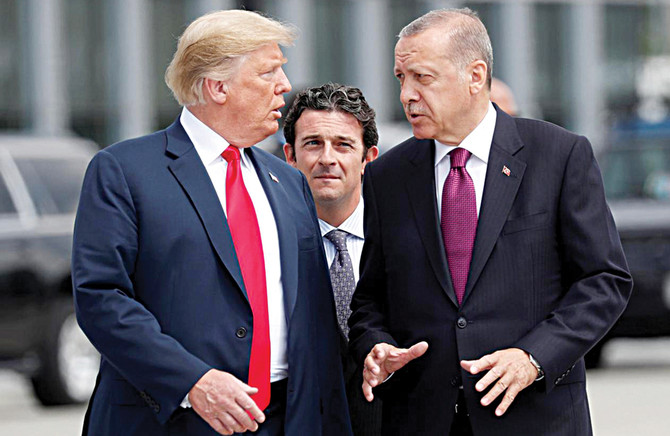ANKARA: Tensions between the US and Turkey will continue in the near future, with the latest developments “ringing the alarm bell,” experts warn.
Since October 2018, when a Turkish court permitted Pastor Andrew Brunson to return to the US after a two-year sentence, relations have still not reached their optimal level.
Despite high-level talks over recent weeks, Washington has showed little inclination to accept Ankara’s demand to establish a 32-km safe zone under Turkish control on the eastern bank of the Euphrates River in Syria after the US announced its withdrawal from the area.
The negotiations have not yet led to an agreement and Turkish President Erdogan recently criticized the US over its delay after Turkey demanded US support for the withdrawal of the Syrian Kurdish YPG militia from the region.
However, in January, Trump threatened to “devastate” the Turkish economy if the country attacked Kurdish forces supported by the US against Daesh, despite Turkey’s strong objections.
The recent visit of US First Lady Melania Trump to a Gulen-movement-linked charter school in Oklahoma on Tuesday also sparked intense debate in Turkey and is likely to further antagonize relations between the two allies.
Ankara believes that the Gulen movement masterminded a failed coup attempt in the country in 2016, and Turkey formally requested the extradition of its US-based leader Fethullah Gulen three years ago.
From a bilateral trade perspective, Washington announced on Monday its plan to remove Turkey from its list of countries with duty-free access, claiming that Turkey “is sufficiently economically developed.” The preferential trade treatment has allowed some exports to enter the US on a duty-free basis.
However, Turkey’s weakening economy, set against the backdrop of a steep drop in the Turkish currency, is likely to be undermined by this decision. Turkey was the fifth-largest supplier to the US with a share of 8.2 percent of goods. The US imported about $20.9 billion of goods under this preferential scheme in the first 11 months of 2018, according to official figures.
The escalatory moves did not stop there. On Tuesday, top US General Curtis Scaparrotti said that the US should not sell F-35 fighter jets to Turkey, a NATO ally, if Ankara purchases the Russian S-400 long-range air defense system.
Ankara has a critical place in the F-35 program as some parts of the jets are built in Turkey. Turkey had refused to meet the Feb. 15 deadline set by the US to cancel the purchase of the S-400 system.
The US had been trying to convince Turkey to buy the Patriot system instead, which is compatible with the NATO defense system. Washington had warned Turkey over possible US sanctions against those who engage in business ties with the Russian defense industry if the purchase was made.
Ali Cinar, a US-based foreign policy expert, said that the lack of trust between Turkey and Washington is likely to continue in 2019, especially in the light of the S-400 issue.
“I don’t expect further deterioration. However, we will see ups and downs in the relationship. An unstable Turkey does not benefit the strategic interests of the US and Turkey, nor does it serve peace and stability in a region already devastated by volatility,” he told Arab News.
He thinks that the partnership between the US and the Syrian Kurdish YPG militia will further strain ties.
But according to Cinar, the two countries do not have the luxury of losing their friendship, and high-level meetings between American and Turkish officials should serve as an opportunity to repair it.
David Satterfield, who has held top posts at US missions in Saudi Arabia, Syria, Egypt and Lebanon, was recently appointed by the White House as the US ambassador in Ankara. The post has been vacant since October 2017 when the former American ambassador left the country amid a visa crisis between Washington and Ankara.
According to Mehmet Ali Tugtan, an expert on transatlantic relations from Istanbul Bilgi University, the main controversy arises from Turkey being allied to two great powers who are engaged in strategic rivalry.
“At some point, you reach the limits of playing one side against the other,” he told Arab News.
“If Turkey acquires both S-400s and F-35s, she would possess area denial capability to both Russia and the US — not to mention her European allies,” Tugtan said. “In F-35 she would also possess a formidable power projection capability against her regional neighbors.”
Tugtan said that the US does not want Turkey to have these capabilities at a time when the alliance between the two countries is in doubt.
“So, the typical US approach in cases like these is a combination of positive gestures, such as the Patriot offer, threats like denying the F-35s, sanctions like the removal from the preferential trade regime and symbolic warnings like the Melania Trumps visit,” he said.
“Although there is no immediate threat of a flare-up, Turkish-US relations are unlikely to rise above this low ebb in the foreseeable future,” Tugtan said.
Ozgur Unluhisarcikli, Ankara office director of the German Marshall Fund of the United States, thinks that recent developments in US-Turkey relations indicate a perfect storm similar to the one witnessed last summer.
“If short-termism prevails over long-term strategic thinking, the vulnerability of US-Turkey relations, emanating from the lack of a relevant strategic framework, mutual distrust and ownership problem could crystallize,” he told Arab News.
For Unluhisarcikli, coinciding with weakening links between the EU and Turkey, further deterioration of relations with the US could put Turkey on a path away from the West.
“This situation is not easily reversible unless there is a strong political will on both sides to do so,” he said.
























